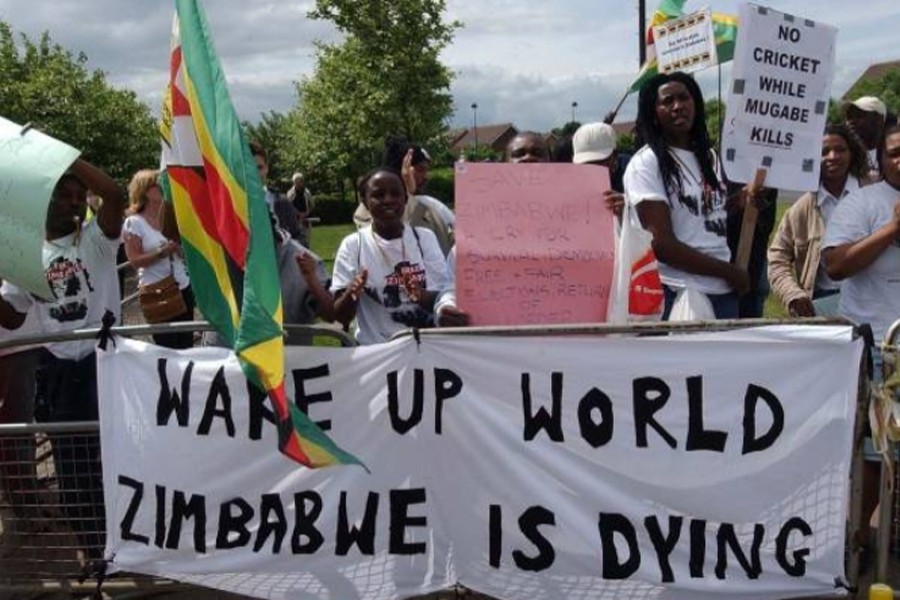If one had to label a team as a friend of Bangladesh cricket, it would definitely be Zimbabwe. Since the turn of the century, the two nations have locked horns 71 times in one-day international (ODI) matches. The second team that come the closest in facing Bangladesh is Sri Lanka with 43 meetings.
However, the favourites going into this fixture have changed over the last two decades. Zimbabwe have gone from being the favourites to now hoping for an upset victory. The men in red have considerably regressed over the years. This author reviews the events that led to such a state.
After getting their Test status in 1992, Zimbabwe cricket enjoyed their golden era between 1997 and 2002 when players like Heath Streak, the Flower brothers, AndiBlignaut, Murray Goodwin, Paul Strand, and Henry Olonga rose to stardom as Zimbabwe defeated all Test-playing nations except Australia. The team finished fifth in the 1999 World cup and reached the finals of many multinational one day tournaments.
The prelude to the downfall of Zimbabwe Cricket can be dated back to 2001 when there had been a reduction in government funding for the sport's development. There were allegations of the national team selection being subject to interference. The players particularly resented the imposition of a quota system that ensured a minimum number of black players would be included in the team.
Allegations have it that the cricket administration in Zimbabwe was corrupt and influenced by Robert Mugabe's government, who were accused of following anti-white policies. Radical policies left the nation in chaos. In protest against the government, two Zimbabwe players – Andy Flower and Henry Olonga –played against Namibia in the 2003 World Cup wearing black armbands that read ‘Death of Democracy.’No wonder, these two players disappeared from the scene soon enough due to this gesture.
In 2004, the Zimbabwe Cricket Union sacked their captain Heath Streak after he had confronted them with the team's grievances. Fifteen first team players went on strike over this and other selection issues, which resulted in their dismissal from Zimbabwe Cricket. By 2005, Zimbabwe team had a completely new look with a young 22-year-old TatendaTaibu taking over the captain’s mantle from Streak. The team had no experienced campaigners who could have turned decline into success.
The results nosedived so badly that Zimbabwe Cricket self-suspended itself from Tests from June 10, 2004, to January 6, 2005. The first match after the suspension was the historic Test at Chittagong where Bangladesh beat Zimbabwe to clinch their first-ever Test win. Mutiny started in the player camp when coach Phil Simmons was fired in the middle of the series against New Zealand in 2005. Shortly after that, Taibu resigned as captain stating, "If we don't do anything, cricket in Zimbabwe will die within a year."
As the year 2006 began, Mugabe's government replaced the board of Zimbabwe Cricket with an interim committee which announced a further 12-month withdrawal from the Test cricket. Zimbabwe did not play any Test match between 2006 and 2010. However, since returning to Test cricket in 2011, they have played only 27 Test matches winning only four of them during the last decade.
Robert Mugabe retained power unopposed in 2008. Britain being critical of Mugabe and his antics to gain power, tried to use cricket to put pressure on the government. England severed all bilateral cricketing ties with Zimbabwe and led calls to suspend them from the ICC. Zimbabwe, realising that the British government wouldn’t grant visas for the Zimbabwe cricket team to take part in the ICC World Twenty20 2009 held in England, pulled out of the tournament at their own volition.
The issue of pay dispute engulfed Zimbabwe Cricket in 2013. The players – unpaid for months – went on strike, resulting in the cancellation of the ODI tournaments that were underway.
The country's cricket hit rock bottom in July 2019 when the ICC suspended Zimbabwe Cricket (ZC) because of the government’s interference in cricketing affairs. The economic condition of Zimbabwe meant that Zimbabwe Cricket did not have enough money to run the game in the country. Failing to qualify for the 2019 ICC World Cup hurt them as ICC events provided participation fees. The maladministration only worsened the case. Zimbabwe’s Sports and Recreation Committee (SRC) did not permit ZC to elect a new board claiming it was unconstitutional and called for a financial audit. Eventually, the SRC complained to ICC about this. The ICC viewed the SRC’s actions as government interference and suspended Zimbabwe Cricket. This resulted in Zimbabwe being ineligible to take part in both the men’s and the women’s Twenty20 World Cup qualifiers held later that year.
In reality, Zimbabwe Cricket hasn’t been the same since 15 senior players walked out of the team in 2004. A norm of any team sport is that established stars help to accommodate the new players. Zimbabwe did not have that. An entire generation of players grew up without the support of the senior players. Government interference, anti-white policies and dispute between the board and players have repeatedly hurt Zimbabwean cricket. The overall economy of the country only makes it worse. The ICC may have lifted the ban on Zimbabwe Cricket, but it remains to be seen how long can cricket survive in such tough conditions.
AymanChowdhury is an undergrad student at Dhaka University.


